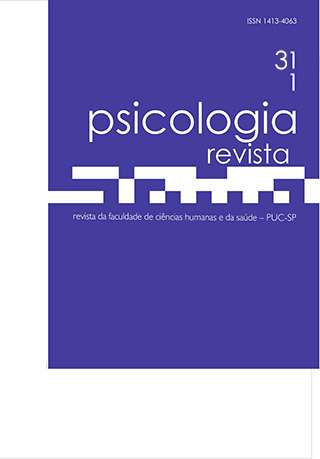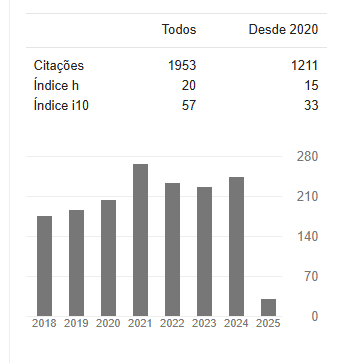Concepción del ser humano en la Clínica Ampliada
una proposición analítico-existencial
DOI:
https://doi.org/10.23925/2594-3871.2022v31i1p11-26Palabras clave:
Clínica Ampliada, Salud, Concepción del ser humano, HeideggerResumen
La Clínica Ampliada es uno de los lineamientos que propone la Política Nacional de Humanización, para calificar la forma de hacer salud pública; se basa en ideas que se refieren a la revisión de la comprensión tradicional de la salud, que privilegia la enfermedad, el síntoma y la cura, el objetivismo positivista y la intervención principalmente orgánica. Como alternativa, la Clínica Ampliada propone valorar al humano en su contexto y en su historia de vida. El artículo desarrolla el pensamiento de que a esta revisión subyace una concepción del ser humano, una vez que la caracterización de cualquier fenómeno humano implica un entendimiento de cómo es el ser humano. Se propone que la concepción analítico-existencial del ser humano, elaborada por el filósofo Martín Heidegger, es compatible con la visión del ser humano implícita en la abordaje de la Clínica Ampliada, ya que también expande la visión tradicional del ser humano, al describirlo como un ser-en-el-mundo.
Citas
Almeida, L. & Leão, L. (2013). Produção de saúde como compromisso da psicologia social. Fragmentos de Cultura, 23(3), 277-289.
Anéas, T. & Ayres, J. R. (2011). Significados e sentidos das práticas de saúde: a ontologia fundamental e a reconstrução do cuidado em saúde. Interface - Comunic., Saúde, Educ., 15 (38), 651-662. DOI: http://dx.doi.org/10.1590/S1414-32832011000300003
Balog, J. (2005). The meaning of health. American J. Of Health Education, 36(5),266-27.
Benevides, R. & Passos, E. (2005). A humanização como dimensão pública das políticas de saúde. Ciência e Saúde Coletiva, 10(3), 561-571. DOI: http://dx.doi.org/10.1590/S1413-81232005000300014
Binswanger, L. (1975). Heidegger’s analytic of existence and its meaning for psychiatry. Em: J. Needleman, Being-in-the-world: selected papers of Ludwig Binswanger (pp. 206-221). London: Souvenir Press.
Borges-Duarte, I. (2010). A fecundidade ontológica da noção de cuidado: de Heidegger a Maria de Lourdes Pintasilgo. Ex Aequo, 21, 115-131.
Brasil, Ministério da Saúde. (2009). Clínica Ampliada e Compartilhada. Brasília: Editora MS.
Brasil, Ministério da Saúde. (2010). Humaniza SUS: documento base para gestores e trabalhadores do SUS. Brasília: Editora do Ministério da Saúde.
Brasil, Ministério da Saúde. (2013). Política Nacional de Humanização PNH. Brasília: Editora do Ministério da Saúde.
Curvo, D., Matos, A., Sousa, W. & Paz, A. (2018). Integralidade e Clínica Ampliada na promoção do direito à saúde das pessoas em situação de rua. Cadernos Brasileiros de Saúde Mental, 10(25), 58-82.
DeLancey, C. (2006). Action, the scientific worldview, and being-in-the-world. In H. Dreyfus & A. Wrathall (Eds.), A Companion to Phenomenology and Existentialism (pp. 356-376). Oxford: Blackwell Publishing.
Dettmann, A., Aragão, E. & Margotto, L. (2016). Uma perspectiva da Clínica Ampliada: as práticas da Psicologia na Assistência Social. Fractal: Revista de Psicologia. 28 (3), 362-369. DOI: https://doi.org/10.1590/1984-0292/1232
Dreyfus, H. (1991). Being-in-the-world: a commentary on Heidegger’s Being and Time Division I. Cambridge: MIT Press.
Heidegger, M. (1986). Kant y el problema de la metafísica. México: Fondo de Cultura Económica.
Heidegger, M. (2001). Seminários de Zollikon. Petrópolis: Vozes/EDUC/ABD.
Heidegger, M. (2006). Ser e Tempo. Petrópolis: Vozes; Bragança Paulista: Universitária São Francisco.
Heidegger, M. (2012). Os problemas fundamentais da fenomenologia. Petrópolis: Vozes.
Markley, O. & Harman, W. (1982). Changing images of man. Oxford; Pergamon Press.
Matta, G. & Camargo Jr., K. (2007). O processo saúde-doença como foco da Psicologia: as tradições teóricas. In M. J. Spink (Ed.), A Psicologia em diálogo com o SUS: prática profissional e produção acadêmica (pp. 129-140). São Paulo: Casa do Psicólogo.
Morales Calatayud, F. (2012). Psicología de la Salud. Realizaciones y interrogantes tras cuatro décadas de desarrollo. Psiencia. Revista Latinoamericana de Ciencia Psicológica. 4(2), 98-104.
Pereira, O. & Almeida, T. (2005). P. A formação médica segundo uma pedagogia de resistência. Interface - Comunic., Saúde, Educ., 9(16), 69-79. DOI: https://doi.org/10.1590/S1414-32832005000100006
Sheehan T. (2014). What, after all, was Heidegger about? Continental Philosophy Review, 47(3-4), 249-274. DOI: https://doi.org/10.1007/s11007-014-9302-4
Shooter, J. (2012). Images of man in psychological research. Chagrin Falls: Taos Institute Publications.
Svenaeus, F. (2013). Naturalistic and phenomenological theories of health: distinctions and connections. Royal Institute of Philosophy Supplement, 72, 221-238. DOI: https://doi.org/10.1017/S135824611300012X
Weikart, R. (2008). The dehumanizing impact of modern thought: Darwin, Marx, Nietzsche, and their followers. Recuperado de http://www.discovery.org/a/6301.
Descargas
Publicado
Cómo citar
Número
Sección
Licencia
Derechos de autor 2022 Marcelo V. Roehe, Daniele Rosa dos Prazeres

Esta obra está bajo una licencia internacional Creative Commons Atribución 4.0.














